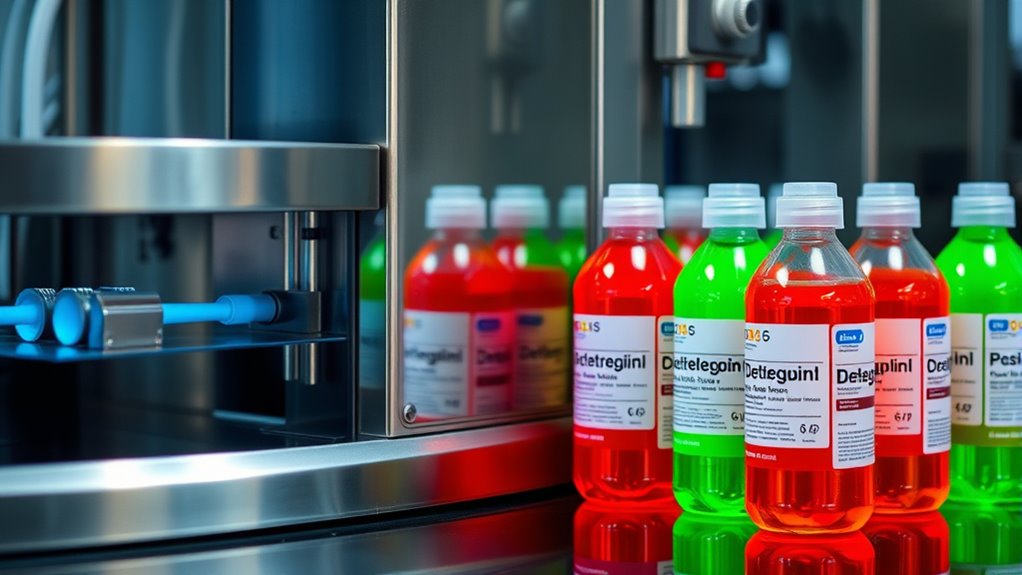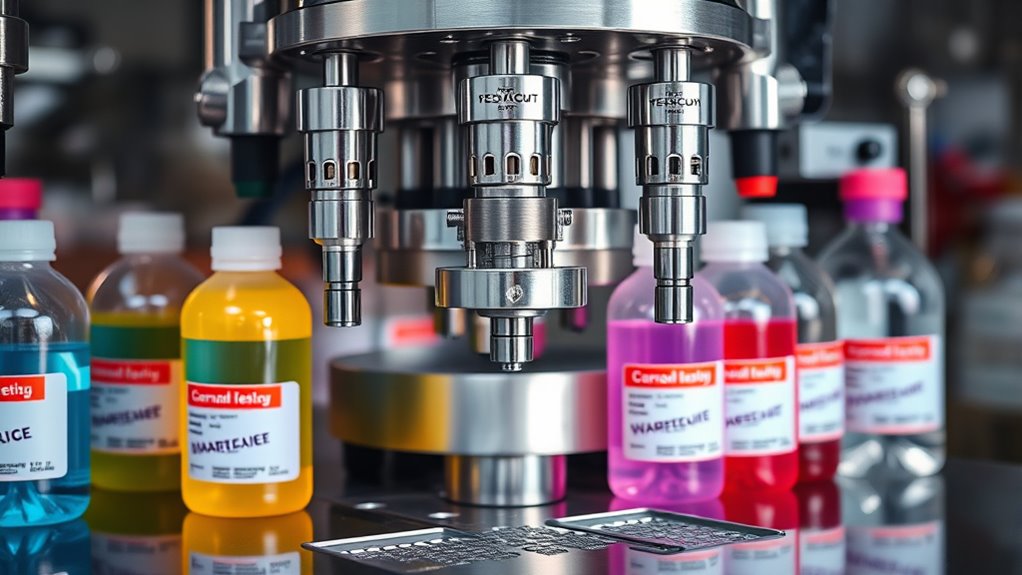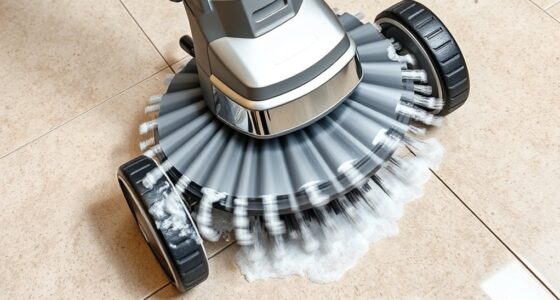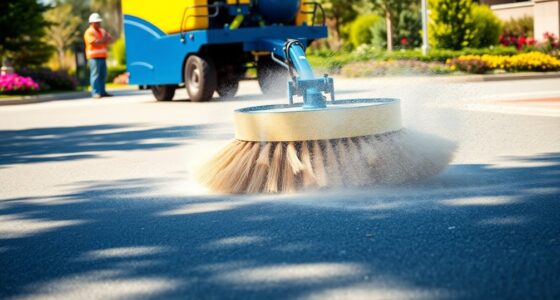To guarantee your specialty machines operate safely and efficiently, you need to match them properly with compatible detergents. Choosing materials with high chemical and corrosion resistance helps prevent damage, failure, and safety risks caused by incompatible chemicals. Always verify that your cleaning agents won’t degrade or corrode your equipment’s components. By understanding chemical compatibility, you protect your investment and maintain smooth operation. Keep exploring to discover key tips for selecting the right detergents and materials for your machines.
Key Takeaways
- Match materials of specialty machines with compatible chemicals and detergents to prevent corrosion and degradation.
- Consider the chemical resistance properties of machine components when selecting cleaning agents.
- Use detergents specifically formulated or tested for compatibility with machine materials to avoid damage.
- Proper chemical compatibility reduces maintenance costs and extends equipment lifespan.
- Prioritize safe co-existence of chemicals and materials to ensure operational safety and product integrity.

Have you ever wondered why certain chemicals safely coexist while others react violently? Understanding chemical compatibility is essential, especially when working with specialty machines and detergents. When selecting equipment or cleaning agents, you need to consider how well materials resist corrosion and withstand various chemicals. Corrosion resistance is critical because it determines whether the material can endure exposure to specific chemicals without degrading. If a machine’s components aren’t resistant to the chemicals used, they can corrode, leading to failures, leaks, or contamination. Chemical resistance, on the other hand, refers to a material’s ability to resist damage or deterioration when in contact with different substances. Both factors are vital to ensure the longevity, safety, and efficiency of your equipment.
Specialty machines often operate in environments where they’re exposed to aggressive chemicals or harsh cleaning agents. Using the wrong materials can cause rapid deterioration, increasing downtime and maintenance costs. For instance, some plastics and alloys are specially formulated to offer high chemical resistance, making them suitable for handling acids, alkalis, or solvents. When selecting these materials, you need to evaluate their corrosion resistance carefully. A material with high corrosion resistance won’t corrode or weaken when exposed to the chemicals used in your process. This means you can maintain your machinery longer, avoid costly repairs, and prevent contamination risks. Additionally, understanding the types of chemicals your equipment will encounter helps in choosing the most compatible materials.
Detergents used in cleaning specialty equipment pose another challenge. Many detergents contain chemicals that, if incompatible, can cause damage or degrade the materials of your machines. For example, alkaline detergents may harm certain plastics, while acidic cleaners could corrode metal parts. By choosing detergents with proven chemical resistance against the materials your equipment is made of, you minimize these risks. Proper selection ensures that cleaning processes don’t compromise the integrity of your machinery, which is especially important in industries like pharmaceuticals, food processing, or chemical manufacturing.
Ultimately, understanding the chemical compatibility of your materials and cleaning agents is a proactive way to safeguard your investments. It involves knowing the chemical resistance properties of your equipment’s materials and matching them to the chemicals in use. Doing so prevents corrosion, damage, and unexpected failures. It also ensures the safety of your staff and the quality of your products. In summary, prioritizing corrosion resistance and chemical resistance when choosing specialty machines and detergents isn’t just about longevity; it’s about creating a reliable, efficient, and safe operational environment.
Frequently Asked Questions
How Do I Test Chemical Compatibility for New Machine Models?
To test chemical compatibility for new machine models, start with chemical testing by applying small amounts of detergents or chemicals to machine parts or materials. Conduct a compatibility assessment by observing any reactions like corrosion, discoloration, or degradation over time. Make sure to follow manufacturer guidelines and use controlled conditions. This proactive approach helps prevent damage, ensuring the chemicals won’t harm your equipment during regular operations.
Are There Industry Standards for Chemical Compatibility Testing?
Yes, there are industry standards for chemical compatibility testing, guided by regulatory guidelines and industry best practices. You should follow these to guarantee safety and effectiveness. Start by reviewing manufacturer instructions and relevant standards from organizations like ASTM or ISO. Conduct thorough testing, including material compatibility assessments, and document your results. Adhering to these standards helps prevent equipment damage and ensures safe operation with new detergents or chemicals.
What Are Common Signs of Chemical Incompatibility in Machines?
You’ll notice signs of chemical incompatibility like unusual noises, leaks, or unusual odors, which indicate a chemical reaction or material degradation. About 60% of machinery failures stem from chemical issues, so staying alert is essential. These signs often appear quickly and can lead to costly repairs if ignored. Regular inspections help catch problems early, ensuring your machine’s longevity and safe operation.
How Often Should Chemical Compatibility Be Reassessed?
You should reassess chemical compatibility regularly, ideally every six months or after any changes in your chemical storage or machine setup. Keep compatibility charts updated and review them whenever you introduce new chemicals or detergents. This proactive approach guarantees safe operation and prevents damage to your equipment. Regular checks help identify potential issues early, maintaining ideal performance and extending the lifespan of your specialty machines.
Can Incompatible Detergents Damage Machine Components Permanently?
Yes, incompatible detergents can cause detergent corrosion and material degradation, potentially leading to permanent damage to your machine components. When you use a detergent that isn’t compatible, it can weaken or corrode parts over time, reducing the equipment’s lifespan. Always verify chemical compatibility before using a new detergent, and address any signs of corrosion or degradation promptly to prevent costly repairs or replacements.
Conclusion
To guarantee your specialty machines perform at their best, always check chemical compatibility, understand the risks, and follow manufacturer guidelines. Protect your equipment, preserve your investment, and maintain ideal performance. By choosing the right detergents, avoiding harmful substances, and staying informed, you safeguard your operations. Ultimately, understanding chemical compatibility isn’t just about safety—it’s about ensuring longevity, efficiency, and peace of mind in every task you undertake.









